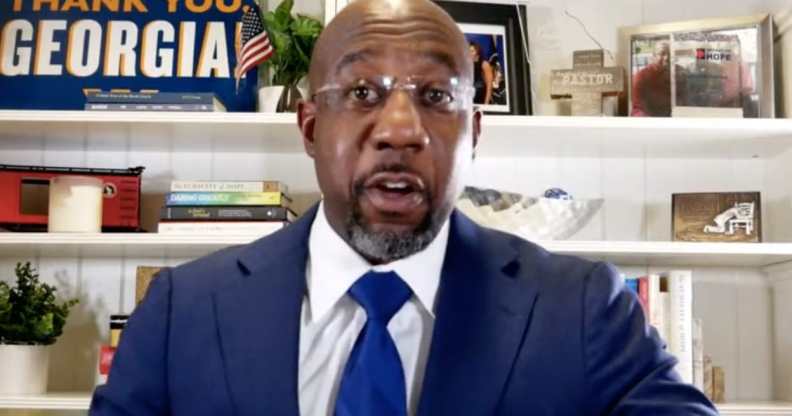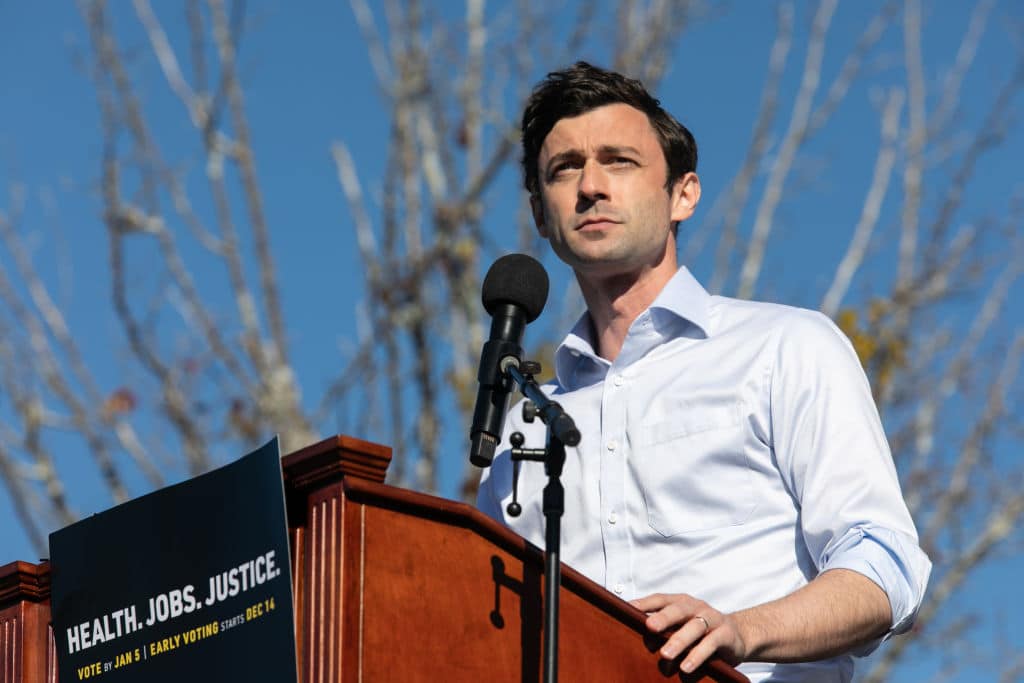Democrat and proud ally Raphael Warnock wins Georgia run-off election – marking a stunning victory for LGBT+ rights

Raphael Warnock gave a virtual victory speech after he was projected as winner in the Georgia run-off election. (YouTube)
Democrat Raphael Warnock has beaten his Republican opponent Kelly Loeffler in the Georgia run-off election – but control of the Senate still hangs in the balance with the second race still too close to call.
Republican senators David Perdue and Kelly Loeffler were forced into a run-off election against their Democratic challengers, Reverend Raphael Warnock and Jon Ossoff, after they failed to draw a majority on election day (3 November).
Warnock was projected as winner in his race in the early hours of Wednesday morning by CNN, CBS and NBC. With 98 per cent of votes counted, Warnock had won 2,223,649 votes (50.6 per cent) compared to Loeffler’s 2,173,804 (49.4 per cent).
If Ossoff beats Perdue in his race, the Senate will be equally split, with vice-president Kamala Harris maintaining a tie-breaking vote – meaning the Democrats would win control of the house, enabling them to set the agenda for LGBT+ rights.
If Democrats win control of the Senate, the Equality Act could finally be passed, which would protect LGBT+ people from discrimination in employment, housing and education by amending the 1964 Civil Rights Act.
However, if Perdue edges Ossoff out of the race, Republicans will maintain control of the Senate, allowing the party to continue its years-long pushback against LGBT+ rights.
Democrat Raphael Warnock is a longtime defender of LGBT+ rights
Warnock’s history-making Georgia win makes him the first African-American Democrat in history to represent a former Confederate state in the Senate.
The senator-elect has been senior pastor of Ebenezer Baptist Church in Atlanta, Georgia, since 2005 – the same church where Martin Luther King served as pastor until his assassination in 1968.
Warnock is a longtime supporter of LGBT+ rights. He is an advocate for same-sex marriage and has vowed to defend the rights of queer people across the United States as senator.
In his victory speech, Raphael Warnock reflected on his childhood in Savannah, Georgia, where he grew up as the eleventh of 12 children.
“I come before you tonight as a man who knows that the improbable journey that led me to this place in this historic moment in America could only happen here,” Warnock told supporters.
“We were told that we couldn’t win this election, but tonight we proved that with hope, hard work and the people by our side, anything is possible. May my story be an inspiration to some young person who is trying to grasp and grab hold of the American dream.”
Warnock promised to represent all voters in Georgia, including those who did not cast a vote for him, and said the country has “a choice to make”.
“Will we continue to divide, distract and dishonour one another, or will we love our neighbours as we love ourselves? Will we play political games while real people suffer? Or will we win righteous fights together, standing shoulder to shoulder for the good of Georgia, for the good of our country?
Together we can do the necessary work and win the future for all of our children.
“Will we seek to destroy one another as enemies or heed the call towards the common good, building together what Doctor King called ‘the beloved community’?”
Warnock went on to address the coronavirus pandemic, saying it could be beaten with “science and good old-fashioned common sense”, and promised to help build a “fairer economy” that respects the “dignity of work”.
Closing his speech, Warnock said: “I remember my dad in this moment. He used to wake me up every morning at dawn. It was morning but it was still dark.
“It’s dark right now, but morning comes, and scripture tells us that weeping may endure for the night, but joy comes in the morning. Let us rise up, greet the morning and meet the challenges of this moment. Together we can do the necessary work and win the future for all of our children.”

If Jon Ossoff (pictured) beats Republican David Perdue, Democrats would win control of the Senate, and would be able to set the agenda for LGBT+ rights. (Jessica McGowan/Getty)
Exit polls show that Warnock won an enormous 92 per cent of Black votes. He also won 67 per cent of votes from those under 30, and had 66 per cent support among urban voters.
More than half of voters who faced financial hardship as a result of the coronavirus pandemic cast a vote for Warnock in the election, according to CBS News.
The Georgia election could have wide implications for LGBT+ rights
Advocacy groups had warned that the Georgia run-off election could have significant ramifications for LGBT+ people across the United States in the coming years.
Sarah Kate Ellis, president of LGBT+ advocacy group GLAAD, told Reuters that the run-off elections puts everything “at stake” when it comes to US LGBT+ rights.
She said: “These two Senate runoff races in Georgia will be defining for the LGBTQ community and whether or not our rights are moved forward in Congress.”
One big example of LGBT+ rights legislation that could be at risk with a Republican Senate is the Equality Act, which has struggled to make its way through Congress.
Gabriele Magni, a professor of political science at Loyola Marymount University, said: “Chances that a Republican-controlled Senate will all of a sudden decide to change their minds on this are very, very limited.”
Both Ossoff and Warnock have committed to voting in favour of the Equality Act – however, Perdue opposes the legislation and has voted in favour of bills that sought to undermine LGBT+ discrimination protections in the past.
The Georgia run-offs could also decide whether a federal ban on LGBT+ conversion therapy comes to fruition, with many Republicans arguing that a ban would infringe on religious freedom.
One of the most talked-about promises that Biden has made when it comes to LGBT+ rights is to overturn Donald Trump’s ban on trans people serving in the US military which, unlike legislation that would require bills to be passed by Congress, he could do using executive powers.

